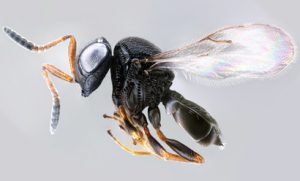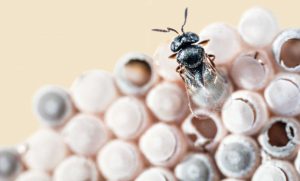
Samurai wasp (Photo by Elijah Talamas)
Many of our fruit and vegetable growers throughout the state have been battling with populations of brown marmorated stink bug. This invasive pest feeds on most fruiting vegetables, small fruits, and tree fruits and can cause significant economic losses. One of the reasons that BMSB is such a bad pest is that when it arrived in the US, it did so without its co-evolved natural enemies. Until now! The Samurai wasp (Trissolcus japonicus) arrived in the US independently and the first populations were found in NJ in 2016 by the Department of Agriculture. However, no populations had been found in agricultural crops, which made us uncertain about its impact.
Last week, a parasitized egg mass was tentatively identified as the Samurai wasp. The Samurai wasp attacks stink bug eggs and has a special appetite for BMSB eggs. A female wasp will lay its eggs into the stink bug eggs. It is an effective parasite of BMSB and can parasitize on average 50% of each egg mass. Our finding was in a commercial peach orchard in southern New Jersey and may be the first finding in a US agricultural crop. We had placed egg masses in the orchard to measure natural enemy impacts of our border spray approach. We do not know the impact the Samurai wasp will have in NJ agriculture but this is a very promising new development in the fight against BMSB. Reduced spray methods, such as border sprays, may help to protect Samurai wasp populations in crops.

Samurai wasp emerging from BMSB egg mass
Drs. Joe Kaser and Clement Akotsen-Mensah contributed to this article.
